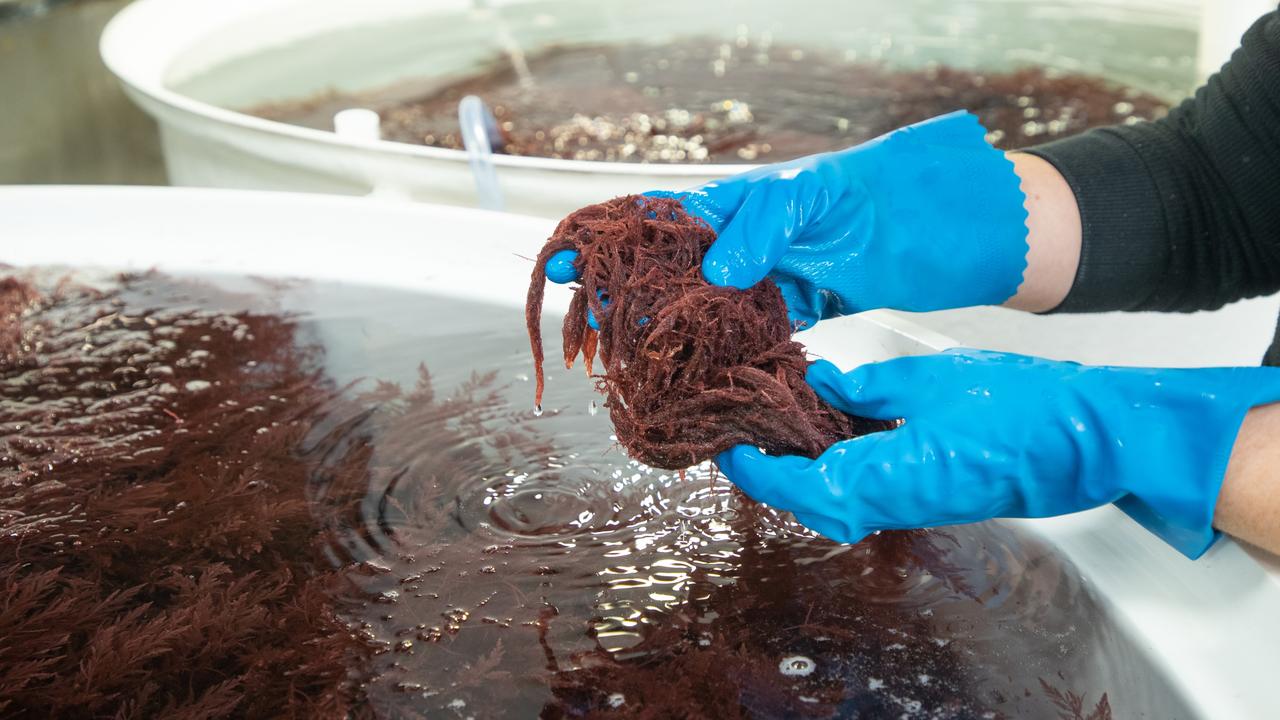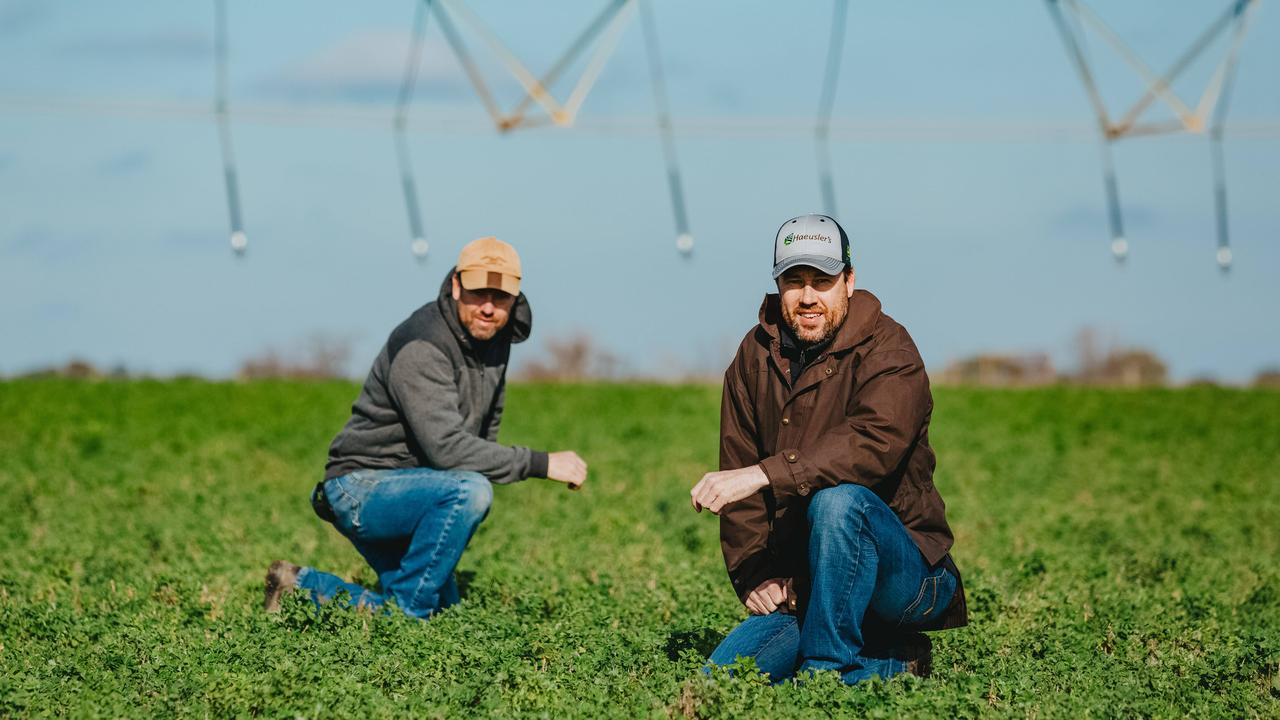Lotus flowers: Blue Lotus Water Garden, Yarra Junction, cornering niche
SUBLIME lotus flowers draw the tourists, while the plants’ surreal-looking seed pods rake in cash from florists. CAMILLE SMITH reports.

GEOFF Cochrane is no shrinking violet.
The veteran horticulturist loves to stand out from the crowd by experimenting with emerging crops to corner a niche market before the masses follow suit.
“I have always been attracted to the idea of doing something different that others don’t do,” says the 69-year-old, who grows lotus flowers and waterlilies in one of the most extensive open-garden displays in Australia.
Geoff and his wife, Yvonne, run Blue Lotus Water Garden at Yarra Junction. The property is Instagrammer heaven. Ponds cover 5.6 hectares, with massive pink flowers on 1.5m stalks stretching as far as the eye can see.
More than 50 lotus varieties and 70 waterlily varieties bloom from December through April, with about 40,000 people flocking through the gates every year during the flowering season.
The garden is primarily an agritourism venture, with adults paying $18 to enter. Visitors can bring a picnic lunch, buy food at on on-site cafe and plants from a nursery, where Geoff grows pot-size varieties of lotus and waterlilies.
However, the Cochranes derive about a third of revenue from selling lotus pods to the floristry trade. Each flower’s yellow cup-like centre forms into a seed pod after petals drop.
The seed pods are surreal looking — massive green shower heads on long, thick stems — and florists love them.
Geoff also sells a smaller number of lotus buds to florists and directly to the public in bunches of three for $12.
“We also sell big quantities to Buddhists, who use them as an offering in their religious ceremonies.” Geoff says. “A Buddhist temple in Berwick buys 2000 buds every year. They take them and open them using a special way of curling the petals.”
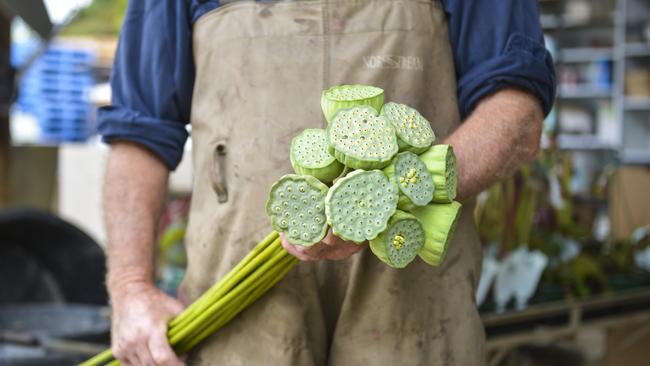
ACCIDENTAL SUCCESS
When Geoff started growing lotus about 15 years ago, he knew the significance of the flower in ancient Egyptian culture and Buddhist religion, but had “no idea about the market for pods”.
Once word spread about his garden, florists started asking to buy the pods.
“They are a staple ingredient in floristry,” Geoff says, pleasantly surprised that his crop choice provided multiple income streams.
Geoff harvests up to 4000 green pods a week during the four-month season, with help from a few casual staff when he has large orders. He says demand is increasing each year.
Pods are graded and packed in cartons of 100 four days a week. Then delivered once a week to wholesalers at Monbulk and the Melbourne flower market.

ASIAN FLAVOUR
Before pioneering lotus, Geoff was a vegetable grower.
Always an innovator, his specialty was wombok — a Chinese cabbage variety that is still considered an emerging industry in Australia — and he spent 35 years mastering the crop.
“I started growing wombok back when it was a new line,” he says, “just after the first Vietnamese immigration, after the war. There were a lot of Vietnamese and Chinese immigrants and demand grew.”
Harvesting cabbages was backbreaking work though, and eventually Geoff started looking for diversification options.
“We got the bright idea we would have a go at fly fishing here,” he says, explaining he ran the cabbage business on a nearby property at Yarra Flats and was looking for an enterprise for the Yarra Junction property.
“So I planted a few lotus and waterlilies to make it look nicer. I didn’t know anything about the plants back then.”
In the 15 years since, Geoff has learnt a lot about fish and water flowers.
“The fishing didn’t work out, the cormorants came and cleared out all the trout we had put in,” he says. “But the plants prospered.
“That’s when I started thinking about opening it as a display garden. Because these flowers were so beautiful, I thought it was a red-hot idea.”
He discovered many lotus varieties were temperate, not tropical as many people, including Geoff, assumed.
The temperate varieties he planted included carolina queen, hindu, roseam plena, green magic, mrs perry slocum and creme lutea, and they thrived in the high-rainfall climate of the Yarra Valley.
After converting the property’s irrigation dams into ponds, Geoff cultivated varieties, then opened the property to the public 12 years ago.
About five years ago, income from the water garden was enough that Geoff wound up his involvement in the wombok farm, which is now run by his youngest son, Paul.
FLOAT HIS BOAT
Harvesting lotus pods is much easier on Geoff’s back than cabbages were. There is far less kneeling and bending required.

Geoff wades into the water to hip height and uses long-handled secateurs that cut and hold each stem. When the pods near the shoreline are collected, he rows a small boat out to deeper water to reach the rest.
“When the boat is piled with harvested pods, it is the most photographed thing in the garden,” Geoff says.
Steady demand for his pods is down to his meticulous grading system, he says.
“We don’t pick all the pods — only half,” he says. “We grade the smaller ones out.
“Basically, florists want them green and pristine. Appearance is everything in the flower trade.”
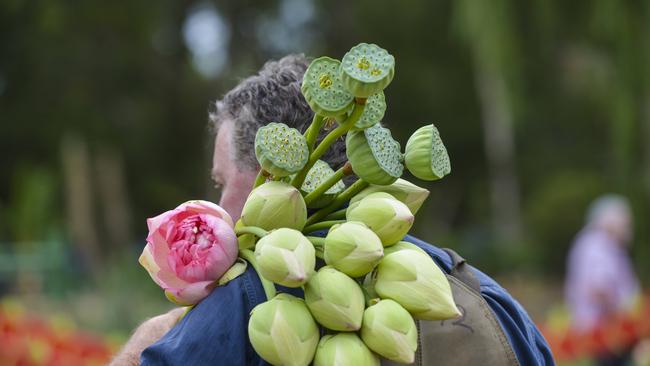
UNDERWATER FEED
When the flowers are dormant from May to September it takes just three people to look after the plantings.
The root systems — called rhizomes — grow in the mud under the water, but the soil can’t be barren clay, Geoff says. He makes compost and throughout winter puts it into the ponds using an excavator.
Come spring, it’s all hands on deck and it takes four months of solid work to prepare the gardens for tourists.
Geoff oversees growing, propagation, pod production and wholesale customers, while his oldest son, Peter, runs the customer-facing parts of the business, including reception, customer service and sales at the garden.
Plants are side-dressed with compost during pod production season to keep nutrient levels up. Geoff says lotus and waterlilies are fairly pest and disease free.
The family also has ponds at Mossman, north of Cairns, where they breed tropical varieties. A few tropical plants thrive in five small greenhouses on the Yarra Junction farm. However, they require the water to be 27C and so a hydronic gas-fuelled heater circulates warm water constantly.
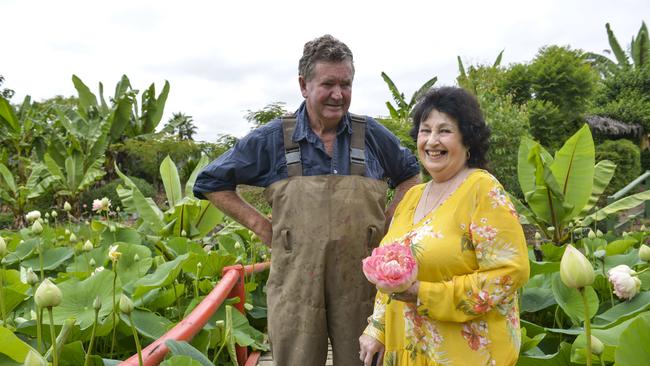
OPEN GATE
Tourism is the bread and butter of the Blue Lotus business, however building up visitor numbers was a challenge.
“We hit a lot of hurdles to get the water garden known as a place people could come and visit,” Geoff says. “Advertising could easily be a big hole in the ground that you dump all your money into.”
Radio didn’t draw crowds, but social media and word of mouth have done wonders for footfall.
“People come get their photo taken in the garden and immediately put it on Facebook. It is free advertising,” he says.
In recent years, Geoff has seen a big increase in Asian and Indian visitors from Melbourne. Similar to his early adoption of wombok in response to immigrant populations of the late ’70s, Geoff believes he has found a customer base with growth potential.
“Asian families are familiar with water gardens,” he says, “The Indian visitors, not so much. But when they put it on Facebook, the community starts to talk about it.
“They love coming out.”
FARM FILE
Blue Lotus Water Garden
Geoff and Yvonne Cochrane grow lotus flowers and waterlilies at Yarra Junction, in an extensive water display garden, which is open to tourists daily from late December through April. Entry is $18 per adult. About a third of the business is primary production with Geoff selling green lotus pods to the floristry trade.
Where: Yarra Junction
More info: bluelotusfarm.com.au

